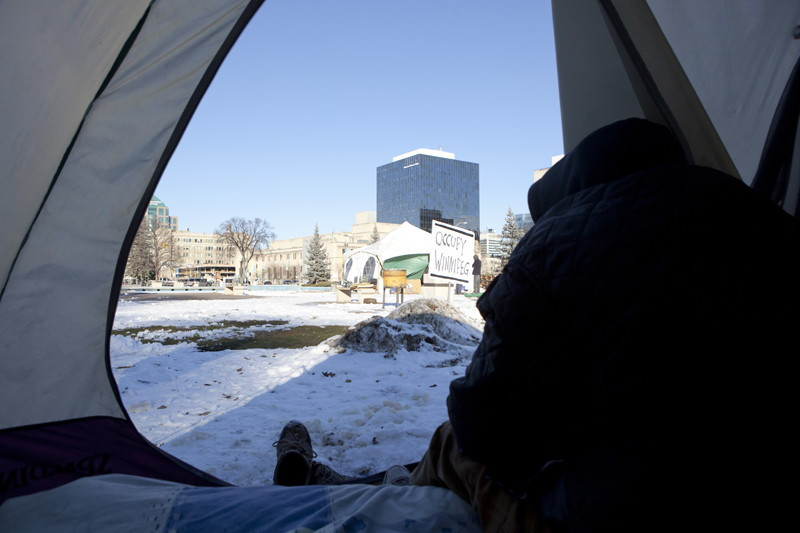Location, location, location
Occupiers discuss the importance of selecting an ideal location to camp
As Occupy encampments across Canada face eviction, protesters are questioning the best means of reorganizing themselves without becoming victims of legal loopholes.
According to an analysis done by The Uniter, Occupy movements in Alberta, British Columbia, Ontario and Manitoba that are encamped on provincial land seem to face fewer obstacles than those on city property. As a result, movements like Occupy Vancouver have begun transferring their camps from city property to provincial spaces.
Louise Willow May, a member of Occupy Winnipeg, explained the movement chose to camp at Memorial Park partly because it’s under provincial jurisdiction.
“It is provincial land and we are dealing with provincial authorities instead of the Winnipeg police department,” she said. “It’s central and very visible, making it a good rally point.”
Occupy Winnipeg’s disputes with the province have been limited so far, May said.
“The province has made requests of us, but none of them are concerns we were not already actively dealing with on our own,” she said.
Antonin Smith, who was in charge of the food tent at Occupy Toronto before it was shut down, believes the eviction took place because St. James Park is city property.
“The mayor’s office and the police gave us some problems,” he said. “Part of me understands because we were basically trespassing.”
Smith, though, welcomes the break from sitting out in the cold.
“It’s actually a little bit refreshing,” he said. “I’ve been there for 41 days.”
Though no decisive plans can be disclosed, Smith said the movement is considering reestablishing itself on provincial lands.
“There are a number of locations being discussed,” he said. “There is also an Occupy North Toronto, situated on provincial grounds. I think going there would be the best idea.”
Meaghan Daniel, a lawyer from Movement Defence Committee legal support, said Occupy Toronto was evicted under the city’s park bylaws.
“Under the park bylaws you basically can’t do anything,” she said. “You can’t use profanity, you can’t light a fire, you can’t have tents and you can’t be there between midnight and 5:30 a.m.”
Movement Defence Committee is an organization dedicated to supplying legal support to progressive movements in Toronto. Daniel first became involved with the group during the G20 protests, where the group offered legal support for various activists.
Presently, Daniel is involved in offering legal support to those involved in the Occupy movement.
“We track all arrests that have taken place in relation to the movement,” she said. “And we keep a list of criminal defence lawyers to provide for the occupiers.”
Though Toronto has park bylaws, it does not have bylaw offences. Finding a way to characterize the movement as an offence is the reason eviction took 41 days, Daniel noted.
“The issue is that they don’t have park bylaw offences,” she said. “So, you have to classify them as breaching the peace or committing some sort of criminal offence.”
Evictions do seem to be taking place largely under mayoral and city authority, adds Daniel.
“It seems like the correlated crack-downs happen on a mayoral level,” she said.
Daniel contends one alternative for the Occupy movement would be to apply for permits.
“I’m not sure if it’s politically consistent with the movement, but I suppose Occupy could have requested permits for what they’re doing,” she said. “However, I think they will always have to negotiate, no matter where or how they organize.”
When the Occupy Toronto camp was still situated in St. James Park, Daniel spent a few nights camping with occupiers.
“I spent a number of nights in St. James Park in Toronto and I don’t think I’ve ever felt that kind of energy in a movement before,” she said.
The city of Toronto’s demands were unrealistic, Daniel added.
“The city wanted our demands right away, they didn’t want us to move slowly to create careful detailed demands,” she said. “I’m not sure a government bureaucracy could make a decision in four weeks and I don’t know why they expected Occupy Toronto to do the same.”
Published in Volume 66, Number 14 of The Uniter (November 30, 2011)







